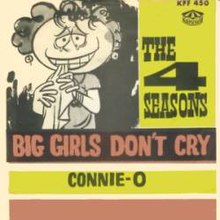
The Four Seasons is an American vocal quartet formed in 1960 in Newark, New Jersey. Since 1970, they have also been known at times as Frankie Valli and the Four Seasons. The band evolved out of a previous band called The Four Lovers, with Frankie Valli as the lead singer, Bob Gaudio on keyboards and tenor vocals, Tommy DeVito on lead guitar and baritone vocals, and Nick Massi on bass guitar and bass vocals. On nearly all of their 1960s hits, they were credited as The 4 Seasons. The band had two distinct lineups that achieved widespread success: the original featuring Valli, Gaudio, DeVito, and Massi that recorded hits throughout the 1960s, and a 1970s quintet consisting of Valli, Lee Shapiro, Gerry Polci, Don Ciccone, and John Paiva, with Gaudio and Long providing studio support.
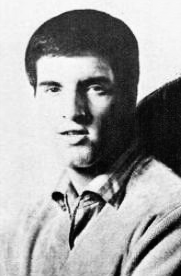
Robert John Gaudio is an American songwriter, singer, musician, and record producer, and the keyboardist and backing vocalist of the pop/rock band the Four Seasons. Gaudio wrote or co-wrote and produced the vast majority of the band's music, including hits like "Sherry" and "December, 1963 ", as well as "Can't Take My Eyes Off You" for Valli. Though he no longer performs with the group, Gaudio and lead singer Frankie Valli remain co-owners of the Four Seasons brand.

"December, 1963 " is a song originally performed by the Four Seasons, written by original Four Seasons keyboard player Bob Gaudio and his future wife Judy Parker, produced by Gaudio, and included on the group's album Who Loves You (1975).

"Bye, Bye, Baby " is a popular song written by Bob Crewe and Bob Gaudio. The Four Seasons' version of the song made it to No. 1 in Canada and No. 12 on the US Billboard Hot 100 in 1965. On the original issue of the single, the title was "Bye Bye Baby". However, on the album, The 4 Seasons Entertain You, and on later issues of the song, the name was changed to the longer, more familiar one. The song is about saying goodbye, not because the person is unloved but rather because the relationship is adulterous.
Robert Stanley Crewe was an American songwriter, dancer, singer, manager, and record producer. Crewe co-wrote and produced a string of Top 10 singles with Bob Gaudio for the Four Seasons.
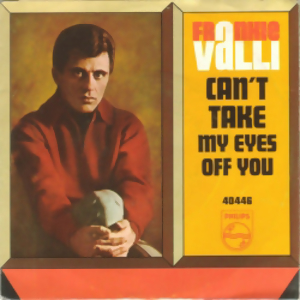
"Can't Take My Eyes Off You" is a 1967 song written by Bob Crewe and Bob Gaudio, and first recorded and released as a single by Gaudio's Four Seasons bandmate Frankie Valli. The song was among his biggest hits, earning a gold record and reaching No. 2 on the Billboard Hot 100 for a week, making it Valli's biggest solo hit until he hit No. 1 in 1975 with "My Eyes Adored You".

"Sherry" is a song written by Bob Gaudio and recorded by The Four Seasons.

"Walk Like a Man" is a song written by Bob Crewe and Bob Gaudio and originally recorded by the Four Seasons.

"Rag Doll" is a popular song written by Bob Crewe and Bob Gaudio. It was recorded by the Four Seasons and released as a single in 1964.
The Four Lovers was a band formed in 1956 that was the result of vocalist Frankie Valli joining The Variatones in 1954. The Four Lovers achieved minor success before a name change to The Four Seasons in 1960. During those five years, group members also included Nicolas DeVito, Hugh Garrity, Charles Calello (bass), Nick Massi, Bob Gaudio, and Philip Mongiovi (drums).
The Wonder Who? was a nom de disque of The Four Seasons for four single records released from 1965 to 1967. It was one of a handful of names used by the group at that time, including Frankie Valli and The Valli Boys. Wonder Who? recordings generally feature the falsetto singing by Valli, but with a softer falsetto than on "typical" Four Seasons recordings.
This is a list of singles and some albums recorded and released by Frankie Valli and/or The Four Seasons in their various guises since 1953. This list includes only commercially released singles on which Valli or some configuration of the group was credited with performing or producing. Promotional-only releases and extended play records (EPs) are omitted from this list.
"Dawn (Go Away)" is a song written by Bob Gaudio and Sandy Linzer and recorded by the Four Seasons in November 1963. The song hit No. 3 in the early part of 1964. According to Billboard, it was the 25th biggest hit single of the year, placing behind "Rag Doll", another Four Seasons hit, which was No. 24.

"Who Loves You" is the title song of a 1975 album by The Four Seasons. It was composed by Bob Gaudio and Judy Parker and produced by Gaudio. It reached number 3 on the Billboard Hot 100 in November 1975.
"Ronnie" is a song by Bob Gaudio and Bob Crewe. The Four Seasons recorded and released the original version in 1964. The recording reached the #6 position on the Billboard Hot 100 singles chart.

"Silver Star" is the lead song on the Four Seasons album Who Loves You. As was the case of all the songs on the LP, it was written by Bob Gaudio and Judy Parker and produced by Gaudio. Drummer Gerry Polci sang lead. Frankie Valli's contribution was limited to harmony vocals, since he was gradually losing his hearing in the 1970s due to otosclerosis. An operation restored most of Valli's hearing in the 1980s.
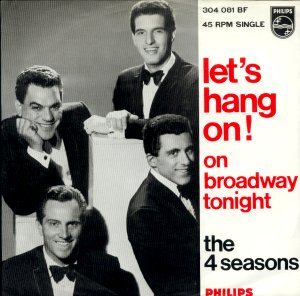
"Let's Hang On!" is a song composed by Bob Crewe, Sandy Linzer, and Denny Randell that was popularized by the Four Seasons in 1965.

"Opus 17 (Don't You Worry 'bout Me)" is a song composed by Sandy Linzer and Denny Randell and recorded by The Four Seasons in 1966 for their album Working My Way Back to You.
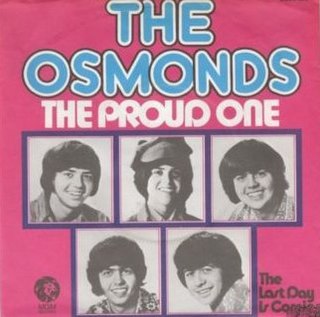
"The Proud One" is a 1966 single written by Bob Gaudio and Bob Crewe and originally performed by Frankie Valli as part of his debut solo album, The 4 Seasons Present Frankie Valli Solo. Valli's version, which featured the Seasons on instrumental backing but not vocals, peaked at #68 in the U.S. and #64 in Canada. Billboard claimed that "the electric sound of Valli is used to perfection in this powerful ballad, stating that the "easy-go dance beat [is] effective." Cash Box said that it is a "powerhouse" and that "the Valli sound holds the moving, teen-oriented tale of love together and the sweeping arrangement adds a must spin again quality to it."

Closeup is an album by Frankie Valli, released in February 1975 on the Private Stock label. It had been seven years since his prior album, and afforded Valli his first of two number-one solo hits in the US. The LP reached number 51 on the U.S. Billboard albums chart.
